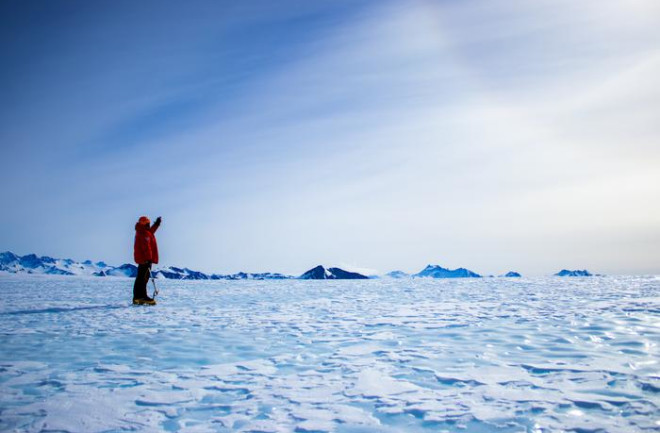As global air temperatures increase, the number of Antarctic meteorites shrinks. By 2050, about a quarter of the 3-800,000 meteorites there will melt away, according to a report from a team of researchers from Switzerland and Belgium.
The team drew upon artificial intelligence, satellite observations, and climate model projections to determine that, for every tenth of a degree increase in global air temperature, an average of nearly 9,000 meteorites will disappear from Antarctica’s ice sheet.
The Impact of Climate Change on Meteorites
Besides serving as an alarming indicator of climate change, the meteorites’ melting deprives scientists of materials that can help tell the story about how the solar system was born because meteorites bring materials from throughout space — from the moon, Mars, or other planets — down to Earth.
“Every time we find a meteorite, we are in fact sampling space,” says Harry Zekollari, one of the study’s co-author. Zekollari, who co-led the study while working under Daniel Farinotti at ETH Zurich, jokes that collecting meteorites in Antarctica is “a "space mission for poor scientists." Zekollari, who is now a professor at Vrije Universiteit Brussel, adds “You don't need to go to space, but it's like space coming to you.”
But the door for that “trip” may be closing. The meteorites are disappearing about five times as fast as they can be collected and examined. Antarctica has the highest known concentration of meteorites on Earth; about 60 percent of all meteorites ever found have been collected from the ice sheet there.
While it may be technically possible to detect metals from the meteorites once they sink beneath the ice sheet, the approach has so far proved difficult. “This is something British scientists tried to do, but it was unfortunately not very successful,” says Zekollari.
Read More: 4 Ways Climate Change Is Already Taking a Toll
Using Technology to Find Meteorites Faster
The best hope to salvage the meteorites — and the data they contain — may be to increase collection efforts, says Veronica Tollenaar, one of the study’s co-authors and a professor at the Université Libre de Bruxelles. “It is a race against the clock,” she says.
To beat that melting clock, she calls for a coordinated international effort. Because some regions contain more meteorites than others, and some areas lose them faster than others, coordination may be essential, she says.
Scientists could also improve their detection methods. Researchers now find most meteorites by driving around on snow scooters. Deploying drones and other remote sensing technologies could hasten the hunt.
Zekollari and Tollenaar say that the only long-term method to preserve the remaining unrecovered Antarctic meteorites is to rapidly reduce greenhouse gas emissions.
Read More: We Can See Disparities in Air Quality From Space
Article Sources:
Our writers at Discovermagazine.com use peer-reviewed studies and high-quality sources for our articles, and our editors review them for accuracy and trustworthiness. Review the sources used below for this article:
Harry Zekollari. Glaciologist and Associate professor at Vrije Universiteit Brussel in Belgium
Daniel Farinotti. Professor and Deputy Head of Laboratory of Hydraulics, Hydrology, and Glaciology at ETH Zurich
British Antarctic Survey. Overview of the Lost Meteorites of Antarctica field campaigns

